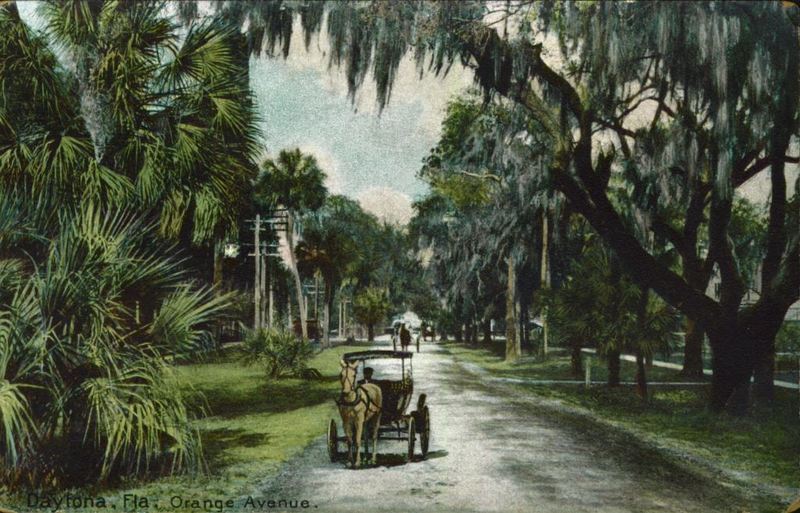Orange Avenue, Daytona
Dublin Core
Title
Orange Avenue, Daytona
Alternative Title
Orange Avenue, Daytona Postcard
Subject
Daytona (Fla.)
Description
A postcard featuring a horse and buggy on Orange Avenue in Daytona, Florida, around 1910. Palm fronds, live oaks, and electric power lines line both sides of the street.
In 1871, Mathias Day, Jr. (1824-1904), a migrant from Mansfield, Ohio, purchased a large tract of land along the west bank of the Halifax River, which included the former Williams Plantation. With the construction of Day's hotel, today's Daytona Beach Historic District was created. In 1876, residents named the city "Daytona," in honor of Day, when the area was incorporated as a town. Growth continued in 1886 when the St. Johns & Halifax River Railway extended to Daytona.
In 1926, the towns of Daytona, Daytona Beach, Kingston, and Seabreeze merged together as Daytona Beach, in an effort led by J. B. Kahn. By this time, the beach had been nicknamed "The World's Most Famous Beach." Automobile and motorcycle races began in 1902, due to the smooth, compacted sand that covered the beach. Daytona Beach became the site of various land speed record attempts. On March 8, 1836, the first stock car race was held at the Daytona Beach Road Course, which is located in present-day Ponce Inlet. Bill France, Sr. (1909-1992) and the National Association for Stock Car Auto Racing (NASCAR) established the Daytona International Speedway in 1958 to replace the beach course.
In 1871, Mathias Day, Jr. (1824-1904), a migrant from Mansfield, Ohio, purchased a large tract of land along the west bank of the Halifax River, which included the former Williams Plantation. With the construction of Day's hotel, today's Daytona Beach Historic District was created. In 1876, residents named the city "Daytona," in honor of Day, when the area was incorporated as a town. Growth continued in 1886 when the St. Johns & Halifax River Railway extended to Daytona.
In 1926, the towns of Daytona, Daytona Beach, Kingston, and Seabreeze merged together as Daytona Beach, in an effort led by J. B. Kahn. By this time, the beach had been nicknamed "The World's Most Famous Beach." Automobile and motorcycle races began in 1902, due to the smooth, compacted sand that covered the beach. Daytona Beach became the site of various land speed record attempts. On March 8, 1836, the first stock car race was held at the Daytona Beach Road Course, which is located in present-day Ponce Inlet. Bill France, Sr. (1909-1992) and the National Association for Stock Car Auto Racing (NASCAR) established the Daytona International Speedway in 1958 to replace the beach course.
Abstract
Unused color postcard of horse and buggy on Orange Avenue, Daytona, Florida. There are palm fronds, live oaks, and electric power lines on either side of the street. "Daytona, Florida. Orange Avenue. Hardly a thousand miles from Greater New York one may find the most delicate and delightful tropical scenery and may dwell in a climate which neither Hawaii nor southern Italy can excel. The name 'The American Riviera' is often applied to the Florida East Coast." - back of postcard.
Source
Original 8 centimeter x 12 centimeter color postcard: "Daytona, Florida, Orange Avenue." The Hugh C. Leighton Company, Portland, Maine: accession number 1057, Stetson University Postcard Collection, Archive and Special Collections, duPont-Ball Library, Stetson University, DeLand, Florida.
Publisher
The Hugh C. Leighton Company
Date Created
ca. 1910
Date Copyrighted
ca. 1910
Has Format
Digital reproduction of original 8 centimeter x 12 centimeter color postcard: "Daytona, Florida, Orange Avenue." The Hugh C. Leighton Company, Portland, Maine: Tag number DP0000102. Central Florida Memory.
Is Format Of
Original 8 centimeter x 12 centimeter color postcard: "Daytona, Florida, Orange Avenue." The Hugh C. Leighton Company, Portland, Maine.
Is Part Of
Stetson University Postcard Collection, Archive and Special Collections, duPont-Ball Library, Stetson University, DeLand, Florida.
Daytona Collection, Seminole County Collection, RICHES of Central Florida.
Format
image/jpg
Extent
172 KB
Medium
8 centimeter x 12 centimeter color postcard
Language
eng
Type
Still Image
Coverage
Orange Avenue, Daytona, Florida
Accrual Method
Donation
Mediator
History Teacher
Geography Teacher
Provenance
Originally published by the Hugh C. Leighton Company.
Rights Holder
Copyright to this resource is held by Stetson University, duPont-Ball Library, Archive and Special Collections and is provided here by RICHES of Central Florida for educational purposes only.
Curator
Cepero, Laura
Source Repository
External Reference
"Local History." Daytona Beach. http://www.daytonabeach.com/resources/history/.
"City of Daytona Beach." City of Daytona Beach. http://www.codb.us/.
Cardwell, Harold D., and Priscilla D. Cardwell. Historic Daytona Beach. Charleston, S.C.: Arcadia Pub, 2004.
Halifax Historical Society (Daytona Beach, Fla.). Timeless Daytona Beach. Daytona Beach, Fla: Halifax Historical Society, 2001.
Transcript
Daytona, Fla. Orange Avenue.
Collection
Citation
“Orange Avenue, Daytona,” RICHES, accessed February 18, 2026, https://richesmi.cah.ucf.edu/omeka/items/show/5054.
